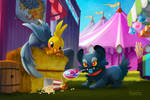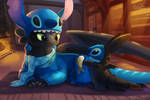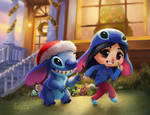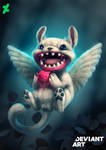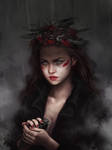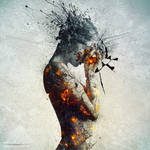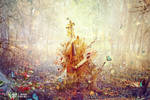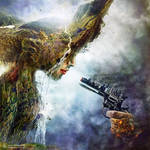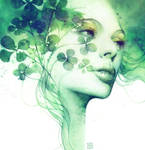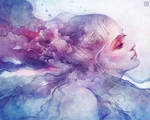Deviation Actions
Do you enjoy art passionately and are considering doing it as your job, but have some worries such as;
If you're like me, you're asking yourself those questions and are letting them give you a hard time deciding whether or not to pursue art professionally. My health teacher told me, as we digressed from our topic of smoking, that to know whether or not you want to do a job, you have to hear what it's like from someone who's already doing it. That's why I decided to do an interview with professional artists on dA to give me, and hopefully many others, answers to these burning questions and an idea of what it's like to be a professional artist.

This is quite long so if you'd like to jump to a section, here are the questions I asked:
Do you work in-house or as a freelancer?
What do you do for your job mainly?
Was it hard getting a job/clients?
Would you say your job has a good income?
Do you enjoy your job? Do you think you'd enjoy art more as a hobby?
Do you ever get tired of art?
Do you ever get art block? If so, how often would you say you get it?
What do you do when you get art block - how much does it affect your work?
How long are your deadlines usually?
How much time do you have for personal work after you're done with all the professional art?
Around how many hours do you spend on drawing in a day?
Do you regret becoming a professional artist?
What are some of the toughest aspects of being a professional artist?
What are some of the best aspects of being a professional artist?
What advice do you have for those wanting to go into the industry?
Anything you would like to add?
and I interviewed:
Do you work in-house or as a freelancer? (I'd originally said company instead of in-house but I was corrected by someone; sorry for any confusion)
Both, actually. My full time job is teaching and I do freelance in my free time.
I work as a freelancer.
I’m employed full time as a conceptual illustrator for a research laboratory. At night, I do freelance illustration as my side business.
At the moment I'm working as a full-time concept artist at a game developing studio CD Projekt RED. Before that I worked as a freelancer for several years.
I work as a freelancer, recently I had the opportunity to go in-house, but realized
I feel and work better being in my own place, with my own hours and schedule.
Happily freelancing for almost 10 years.
Actually both. I work part-time as a brand manager and freelance. It's a bit odd but I love the part-time job and the team and I love the projects as a freelancer so I do both and complain about the weekly hours.
At the moment I’m a senior majoring in illustration at the Savannah College of Art and Design. I freelance on a part time basis.
What do you do for your job mainly?
I teach art, mostly digital painting.
I work as an illustrator mostly, creating marketing illustrations for video game characters and card art for digital card games. Occasionally I will do concept art or asset creation for games.
It’s difficult to describe my full time work since it is confidential but most of it is illustration and design related. I basically draw things that don’t exist yet but might 10-20 years from now.
I work mainly as a concept artist but as a 2D artist I also sometimes help with illustrations, interfaces and any graphical tid-bits needed for creating video games.
I do Illustrations for the company Plaid Hait Games, I aso [also] do private commisions on the side, and work on personal projects.
I illustrate and design CD album covers and packagings as well as books.
Uh, that depends on the project and the job. As a brand manager I pamper brands. It's my first year (after working as a Studio Director for some years) so I'm a rookie, in a totally different business branch and... it's quite as different from my normal "me is illustrator" job as it can be. I take care of the bookings, the schedules, marketing texts, image material and everything else needed. It's being a Kraken with 8 arms keeping everybody who works for the brand walking into the same direction.
As a freelancer I mostly work for board games and game companies and I mainly "make things pretty" as my mum would put it. ![]() That's the illustrating and layouting job. It's what people would expect from a job in the branch. I meet with the clients, test play the prototype and have to come up with a concept- or work with the visual concept the team already decided on.
That's the illustrating and layouting job. It's what people would expect from a job in the branch. I meet with the clients, test play the prototype and have to come up with a concept- or work with the visual concept the team already decided on.
I enjoy working with books, posters, advertising, comics and magazine publications. I’m also interested in gallery work and exhibitions.
Was it hard getting a job/clients?
For me, it wasn't. Maybe I am just lucky, but it was usually the case where the client/job looked for me instead of the other way round.
I have been fortunate enough to secure a steady job with a client that constantly has work available for me. I'm always looking for additional work to do "on the side", which so far has been hit-and-miss. I can't say it's particularly hard finding clients, but it's certainly hard to find a good client.
It was difficult finding a job when I graduated. It took some time before I landed my current position and that was after a big move that took me across the country just to work at it. Now that I’ve been established in my career for over 10 years, it isn’t too difficult to find clients for outside work.
Getting clients as a freelancer was a bit tricky at the beginning. I wouldn't call it hard though. I just had to advertise quite a lot in many different places to get enough orders to pay my bills. It got easier with time though - clients often advertise artist by simply showing their work and telling other people who did it. Advertisement companies often come back to artist if they're satisfied with their work too.
Getting a full time job as an artist was a bit trickier though. Only highly specialized companies look for concept/illustrative artist. I went through a ton of interviews before getting my first full-time job and even then I started off as an intern.
I haven´t face that issue yet, I was lucky to be contacted by clients since the beginning
and since then I haven´t had the need to look myself. But I do plan
this year to contact some companies that I would love to work for.
It always is for a freelancer, but if you expose your artworks the right way you've got a chance of potential clients discovering your work.
At the very beginning aka 11 years ago yes. You are new, you are a decent illustrator but you have no clue and nobody knows you. Nobody is screaming "yes, we waited for you!Thank god, you're finally here" So you have to put in a lot of hours getting an idea where you want to work, if you can work there and why the heck these guys should hire you.
There are a lot of people and companies out there who expect to get custom work for supermarket prices and it's still one of the things that annoys me in the creative business. Sadly that hasn't changed in the last 11 years.
I slowly and steadily worked some good jobs, odd jobs and weird jobs and now I mostly take care of keeping my main clients because in the end these regular clients make your life a lot easier. They also feed me with most of my jobs and the rest is picking up interesting commissions or projects.
My mentor (Dr. W. Scheiffele) always said: If you can't make it through the first 3 years and come out with a steady income it might not be the right job. I always kept that in mind.
Marketing myself at the beginning was tough. I’ve found that having an online presence is tremendously helpful for both personal and professional artistic communication. Almost all clients have found me via social media sites such as facebook, deviantart, tumblr etc. Updating often helps your work become more consistent, visible, and recognizable.
Would you say your job has a good income?
Yeah, it's pretty decent.
Yes. Especially for my age (24), I earn above average with my current work. Of course, I am a freelancer, so I'm obliged to earn more than average since I do not receive any of the benefits that people usually get working inhouse.
I’m pretty happy with the compensation from my full time job. The additional income from my side business helps as well.
Yes. Artists do get a decent pay as long as they're not afraid to say how much they want for their services. If someone doesn't want to pay... well, it's their problem. The artist has the time to do whatever they want in the meantime - either work for someone else or find a job that's actually well paid.
At this moment, yes, but I think it is always relavite [relative], considering I am alone and don´t have a family to support
and don´t have mayor expenses, it works pretty well for me.
As of today, absolutely.
Yes. I think it depends on what you expect, need and want to safe up for "bad times". In my opinion it's really important being able to have a financial security blanket for all the things that could happen. Like a dying computer or a dead Wacom tablet. I'm a total hamster and happy with the habit.
There is no set income which can be intimidating. One month may be hectic with commissions, and another may be very limited. It’s tricky to navigate financially, particularly at the beginning, but it’s worth it!
Do you enjoy your job? Do you think you'd enjoy art more as a hobby?
Of course I enjoy my job. If it were as a hobby, it would be less stressful, but I can't think of any other job I'd like to do.
I don't think you should lose art as a hobby when you make it into your job. This is something I've learned only recently and I can't speak for all artists of course, but for me it's been a balance that I've had to find. I used to do only professional work and zero personal work, and that does make art a lot less enjoyable, at least for me, because you're always working for someone else. It's important to not lose yourself in your work and remember to have fun with it. Additionally, I think art is really no different from any other job in the sense that sometimes you will love what you do and sometimes you will hate it. Not every assignment is equally fun, but overall yes, I'd say art is a pretty cool career path.
Since I have a full time career and a side business I get to enjoy art both as a job and a hobby. I never really see either as a chore and I like both equally.
I'm lucky enough to have my job and hobby all in one. I couldn't be happier with it!
I love my job, it makes me happy, and no, art is part of who I am, I love doing it everyday, and not only
for clients work but in my free times for myself too. It is my way to process the world around me and express myself,
I could not see myself doing anything else.
I wouldn't call it a "job", but a way of life, so in that case, it's this or nothing.
That's.... complicated because you ask me a black and white question and I think it's a lot of grey inbetween.
I love my job- both of them. But it's a difference if you do art simply because you want to or because you have to finish the last... 60 or so illustrations because of a deadline. And bills. As a teenager I simply enjoyed being able to paint. Now there are some exhausting and frustrating moments or those when I'm totally overworked and have to push myself to work some more.
The thing is: Life's not always happy whoopee sunshine and you will always have stressfull moments in every job. Just because it's a creative job it doesn't mean you have a guarantee for happiness full-time. I love the rush when a project is done and over. Or when I see the first print. Or good campaign results. I guess you have to find the little and big achievments in your daily job that keep you happy and tide you over the stressfull days.
Yes! It began as a hobby, but pursuing art professionally provides an exciting challenge.
Do you ever get tired of art?
Never! ![]()
Oh, yes. Mind you this is very personal so don't take this as any sort of standard. Everyone struggles with their art occasionally, but when you're a professional you have no choice but to keep going. There are always deadlines that need to be met, so even if you're really not feeling up to the job you have to sit yourself down and get to it anyway. This is tiring sometimes, but at the same time you do feel very accomplished when you finally get the job done.
I never get tired of art mentally but I do physically. I have to take breaks often or my shoulder and arms get pretty locked up.
Yes. You can get tired of anything if you do it for too long. Sometimes I just like to be lazy and do nothing the whole weekend. I doubt I will ever get fed up with art though. A few days is a max.
No , I do get tired as anyone else, but not of Art itself, just of overworking and stress, but
never of art, Is hard for me to ever vision myself getting tired of it, it is
such an infinite world to explore, and so many thing to learn at every moment.
From time to time I get blocked just as much as everyone else. Our brains need to rest once in a while!
Heck yes. But only if I simply overdid it and I need a down time. It doesn't mean I can't appreciate art itself- I just don't want to make a single stroke myself for some days.
There are days where I’ve spent too much time in front of a computer and need to take a break from the screen. I often find escape outdoors.
Do you ever get art block? If so, how often would you say you get it?
I get it quite often, maybe every 2 - 3 months. I get pieces of artwork that I just can't complete. I just stop and take a break. The uncompleted artworks get trashed.
Absolutely. Again this is very personal, but I get it quite often. I've found that my art blocks are almost always tied to unrealistic expectations I have of myself and a lack of self-esteem as a result. Almost every artist I know understands this feeling, so it's certainly not an uncommon occurrence.
I haven’t dealt with an art block for years now.
Over the years I stopped believing in art block. From the perspective of time I find what I usually called "an art block" to only be pent up stress, even if it was only stress connected with not being able to express myself the way I'd like to. Everyone has better or worse days, but can you imagine a surgeon refusing to operate because they're not in the mood?
Art isn't a magical process that can only be done at the right time and perfect circumstances. If it was there wouldn't be tutorials, guides or even step-by-step process illustrations. Even when you're in a bad mood you should know all the steps you're supposed to do to create a certain piece, just like a baker knows the steps needed for producing bread or an architect for creating a design of a house. The result might not be the work of your life, but will still be a solid piece of work.
I would not really say so, I do get tired of work sometimes, because of several reasons like a
demanding projects or deadlines, but at those moments I still wat [want] to do things for myself,
just paint or draw whatever I want and it helps me relax.
There are days that maybe I don´t have any mayor idea or I am tired, but then in those days
I choose to rest, do something else, take a day off or something, but after one or two days off
I have my head full of things I want to try and paint, so I don´t need to push it.
I don´t think I will ever reach a moment when I have done everything I want to, there is always something
else to do for me. The world is never still, so there should always be something out there to
inspire you.
It uses to occur at least once a year, alongside an existential crisis. I think it happens to all of us!
Maybe once a year. I am trained to work around art blocks. That's one of the perks if you have to come up very fast with ideas because a client/the company needs some good ones and I work best when under a lot of pressure so my art blocks tend to happen when I have absoluetely nothing to do and insanely bored. I have a stash of sketches and flats for these occasions and finish things I started. Sometimes I spend days working on new custom brushes or enjoying the perks of a lot of free time with zero personal expectations.
Sure, I often get art block especially when starting a new project.
What do you do when you get art block - how much does it affect your work?
I take a break from it and usually just trash the uncompleted work. If it's a commission however, I'd have to grit my teeth and persevere to the end because no client wants to hear or care that I have trouble finishing their work.
The biggest problem with having an art block is that you get sucked down a spiral of guilt and a lack of motivation. If you start giving in to either, it will take you a long time to climb back out. I've been there, as have most artists I know. The thing is, motivation isn't something that comes to you by chance - motivation is actually something you can (and should) train by doing. My personal motivation-killers are my high expectations for myself and, funnily enough, not doing anything. The more I do nothing, the less I want to do something. So that's what I do when I find myself in an art block - I make sure I will not be distracted by uninstalling my games, blocking non-art related websites I frequent, putting on some music and whipping out my sketchbook or starting up Photoshop, and then I draw. I try my best to not to worry about what I draw, or how well I draw, or that it's not work-related, so long as I'm drawing. This works best for me personally.
I try to keep a list of drawings that I want to do and the list is much longer than I can actually tackle. I also draw multiple drawings at once so that I can juggle them if I’m stuck on a particular aspect of one of them. Making progress on one usually gives me the motivation to push through any challenges in the other.
Well, the way I would get pass a moment of not feeling like working or that I am not feeling happy
with my work, frustrated or anything like that, is I still try, for example sometimes I do have an idea that I really
want to do, but then I start and nothing goes well and it looks bad, and it´s ok, I will just
try the next day again, or take a day off, and then come back with a fresh mind and eyes.
But not overthink it too much, don´t get caught in the frustration of an "art block" , it is
only something mental and the predisposition you put yourself into, some sort of excuse
to tell yourself and stop working, great ideas and results comes from hard and constant work.
Over the years I've discovered there's little you can do, apart of getting relaxed and trying not to think much about it. I try to do other creative things, such as writing or composing music or just doing nothing at all. If you focus so much in your block I think it gets bigger.
I realize my ideas are dull. Boring and missing "the spark". I feel itchy and restless and moody and that usually results in even worse ideas. That's the reason why I gave up working on new things when I'm in an art block.
I try to push through as quickly as I can. Either I take a break from art, or work on an entirely new piece. So occasionally art blocks can be productive!
How long are your deadlines usually?
2-4 weeks, usually.
Usually a week for a single full color illustration.
For my day job, my deadlines are pretty generous for the most part. I adjust my illustration style to fit within the time I’m given. Some projects are needed within a few hours and others are so complicated that they take a week.
It's a very hard question because of how general it is. When I worked as a freelancer I sometimes had a few months to create an illustrations, and sometimes just a couple of hours. I used to have calls from companies that boiled down to "We need X illustrations to do for tomorrow morning. We're paying Y. Are you taking it?".
Now my schedule is set by my producer and depending on the task I usually have a few days up to a few weeks to work on something before moving on to something else.
It really depends on the projects, the one I am working now has been going for almost a year,
so it is relavite [relative].
The get shorter as I get older! Lately no more than a month, having several of them the same month.
That depends on the project. Sometimes a day, sometimes 10 months. At the moment I work on two projects with an official 3 months deadline but to be honest I should finish today and I think it will be a very long night.
I normally set a deadline for around two weeks after approval of the initial sketch. However, the exact time varies based on the scope of the project and alterations required.
How much time do you have for personal work after you're done with all the professional art?
Not much, but I try to squeeze an hour or two here and there.
Several hours at least. I don't always use it for personal work though.
The evenings and weekends are my own and I usually spend a good deal of that time working on my personal work.
I usually work 8 hours a day. Most of that time is drawing. After that I usually get home and draw an hour or two more just for fun - more if I'm working on some personal project.
Not as much as I would like for sure, but I am very organize, so I wake up and work during the day,
usually finish what I have to do for that day inside the normal working hours, and then in the afternoon
I have the time to do whatever I want. There are days that by then I am too tired to do
personal work, but some others I can keep going for hours If I feel motivated.
Also on weekends I give myself more hours just for my personal work, or the entire day.
Not much. In fact, when you're overloaded with commissions, the very last thing you want is to spend your little free time doing personal stuff. I prefer to chill out in other things. I always thought I'd never reach a point in which I would put my personal artworks aside, but I can't help about that. I don't want my brain to explode considering I work around 10 hours a day on average.
At the moment zero. But that's due to the fact that I will be off work for over 4 weeks (April) due to an operation and I have to work around it. Usually I have 2-3 months per year I can work excessively on personal stuff and around 1-2 days per week when the annual jobs start. Since most of the projects are usually timed with fairs (book or game fairs... or even conventions) it's calculable.
And just because I have time doesn't always mean I feel like painting after having painted for.... eg 7 days in a row with daily 8-17 hours already. ![]()
Sometimes I work on a personal piece while working on a commissioned piece. I find it helpful to work on more than one piece at a time in order to stay motivated in the painting process.
Around how many hours do you spend on drawing in a day?
Average about 5 hours, I'd say.
It varies depending on how much work I have and whether I have a personal project to work on. On average, I'd say 6 hours a day.
I am usually drawing all day and all night. It’s probably a good 12-14 hours of drawing.
[8 hours]
It goes from 8 up to 12.
I guess that for "drawing" you mean "creating", overall. Well, it depends. I spend a big part of the day doing promo (social media, keep the portfolio and blog up to date, mailing, getting back to clients and such), so I'd say that on average, 4-5 hours.
Depends on personal vs job and when the deadline is and how many things I still have to do. Usually it's at least 4 hours, sometimes 17 when the schedules and planning is totally messed up.
When I’m focused I can spend the whole day drawing. Other days may be slower with limited drawing sessions. I do try to draw everyday though, even if it’s brief.
Do you regret becoming a professional artist?
No regrets! ![]() I can't imagine what I'd be if I weren't an artist. Bookshop owner or librarian, maybe.
I can't imagine what I'd be if I weren't an artist. Bookshop owner or librarian, maybe.
No. I sometimes wonder what my life would have been like if I hadn't pursued art as a career, but this is who I am and I rolled into this career naturally - it wasn't really a choice. I've found there's not much use in looking back and wondering what could have been, so I don't.
Never. I can’t imagine doing anything else!
Not at all. It's the best thing that could have ever happened to me!
No, for me it was the best decision I could have taken.
I am happy of it everyday.
Never did and never will.
No. Never.
Occasionally when I’m feeling uninspired, I think: am I crazy for dedicating my time to art? But mostly I don’t worry about choosing art as a career. I often remind myself of how lucky I am to be born in a society where I can follow my passion professionally.
What are some of the toughest aspects of being a professional artist?
Meeting the expectations of my clients. Some are really flexible about things, but I've had a couple who had very exacting standards.
I don't think this question is specific enough - there are many ways to be a "professional artist" and each way has it's own set of challenges. For me as a freelance illustrator working from home, the toughest aspect is to stay focused and maintain a good planning.
Dealing with people who don’t understand your job at all. I feel like a lot of people don’t realize the amount of technical skill and training that a professional artist has. You get second-guessed a lot by people who “know” how to use Photoshop because they can remove red eye from their photos.
There are times you need to draw something you don't like. Some decisions are made by the client and you just can't change them even if your aesthetic sense is screaming in pain ![]()
It is not as stable as others jobs for sure, it depends on yourself and your
personal discipline, whether you get better or not it is all up to you and hard work.
It is a very weird place to be at moments, because arts inevitably gets mixed with
who you are as a person, so dealing with rejection, critics and things like that might get you on a more
deeper level than other professions.
It is not easy, I mean if you want to be really good, there will be things you will have to
compromise, but I believe it is that way on any profession, you will have to choose
to what you invest yourself and your time, and it will be very consuming of those things,
but If it is what you love and motivates you, it won´t be a sacrifice.
The promotional aspect is usually discouraging and very time consuming. Also, few clients are not very respectful and they put you on your nerve. Luckily I deal with them via e-mail so they can't see my burning eyes!
Probably seeing my hubby suffering through the (my) 17-hours days. He usually sits with me in the Studio room and reads or talks with me while I work (if he's at home and not at work) and we had a lot of "why on earth are you doing this?!" moments.
He's not a creative and sometimes it's hard to explain my decisions like why I don't want to take a job even though the payment is better than the one I chose instead or why I have to work at the week-end. Or why I get restless on holidays after 5 days already.
You have to calculate your decisions (can I afford it?) and sometimes you have to work with people you might not really like.
I'd say the last one would be learning to say No. It took me some years to learn saying it without feeling bad or guilty.
It can be difficult finding a balance between professional and personal work, and not to feel burned out by jobs. While I do enjoy freelancing, I think my ultimate goal is to make a living off personal art. It’s the most rewarding form of art. If that’s attainable and where that would lead I have no idea! Thinking about what’s yet to come makes me anxious - in the best of ways.
What are some of the best aspects of being a professional artist?
Well, it's a job I enjoy.
Same as the above - this will be different for every professional artist. For me though, it is the freedom of being my own boss, and bringing to life fantastical worlds and characters through my art for others to enjoy.
The feeling you get after completing a project is pretty great. I always get excited when I’m finishing up an illustration and adding the final touches. Also, being paid to draw all day is pretty awesome!
Having fun and getting paid for it!
I think if you chose to be an artist, it is because you love it and it is your
life passion, and it will makes you happy every day, it will keep your mind awake, it will challenge you constantly
and keep you searching for improvement and learning, and what better than that.
Making a living out of what you absolutely love. And of course, working from the freedom of your own home and having the chance of being your own boss and having your own schedules.
I think... for me it's the Eureka-moments.
Like "Eureka, Open GL is so cool" or "Eureka, this is my game in the store" or "Eureka, I didn't know I'd get to work with XY".
And probably my parents not fretting anymore over my job choice.
I like being able to interpret a client’s wishes using my own voice as an illustrator. And there’s nothing more pleasing about the process than the satisfaction if both the client and I are happy with the finish. With freelance, you’re in complete control (which is both liberating and daunting). I like that I often have a flexible schedule, where I have the perks of managing my own hours, pricing, and number of clients. And of course it’s rewarding to have a job you love, where you can’t imagine retiring from.
What advice do you have for those wanting to go into the industry?
Well, this is just my thoughts on this; opinions do vary.
Firstly, consider which are the clients/companies you're the most interested in, and look at their products. If your artwork can match the standard and style of what they already have, then great, you can write in to them and request a job.
If your skill level is still far from it, then don't try. Improve your portfolio first.
If your skill level is close, you can usually make an impression during the interview. (This is for full time job, not freelance) I have seen people whose skills were not that great, but got into the company they wanted because they really hit it off well with the interviewer or the team.
Social skills are very important when joining a company. The more you can interact well and work well with the people there, the more they'll like you.
If you are more introverted, you can go for freelancing instead, as usually communication is by email. You'll be working by yourself with some input from the person art-directing you, but it's minimal (in my experience).
It's the same freelancing as full time, you look for the company you'd like to freelance for, make sure your artwork is of their standard and style and contact them.
Know what you want, and know what you need to do to get there. It's not necessary to know exactly what you want to do (hell - more often than not you need to try something before you know whether it's really for you), but if you have a good idea of a direction you want to go in, you will make things much easier for yourself. For example, "I want to be a concept artist" is incredibly ambiguous. It's not a goal, it doesn't even give you a direction, because "concept art" encompasses a huge variety of subjects, styles and purposes. It's not measurable. A better direction would be, "I want to be a character designer for Blizzard". Regardless of whether or not you will actually achieve that goal, it gives you a very strong direction - both in subject (characters), style and quality. As a bonus, Blizzard has published a set of requirements for their artists to give you a neat list of things you need to master. Work towards a clear, measurable goal and you will have a much easier time getting somewhere. Perhaps you will discover that your initial goal isn't at all what you want to do - that is actually a good thing! Finding out what you don't want is almost as important as knowing what you do want.
The best advertisement for your abilities is your portfolio. Make sure your pieces are eye catching and show your strengths. Don't be afraid to market yourself and use social media to spread your work!
If you love art and really have that gut feeling you'd like to do it for the rest or your life... then go for it! Practice and don't let anyone make you feel bad - there's plenty work for artists and it is possible to live from art alone. Be dedicated, work hard to get better and everything will work out just fine.
Know what you want, I mean, if this is what you want to do, and art is the love of your life,
you should be Ok, just be constant in your work, work really really hard, learn from everything and everyone you see,
don´t be afraid to try new things or make mistakes, don´t care too much about what people might think,
do it for yourself and be honest about who you are, and that will translate into your work.
If you enjoy what you are doing, people will get a good feeling from what you do.
Be a good person, this might sound weird, but it is a relatively small industry and the way you
act towards people and how you handle clients and situations will count, a lot. So always meet deadlines, be really
responsible, be kind to people, always be humble and respectful, and always give the very best you can give.
And just focus on your work, and work hard.
Apart of the obvious things (work hard, do lots of promo, be original, and such), my piece of advice is to be unique in the way you communicate with your followers and clients. Usually we try to find the common ground and try to be as correct as possible, but I think we must let our own personality flow with our words so people can feel they are treating with someone unique.
What I'd say is be open-minded. If you fail at something or experience something you consider bad learn from it. I always learn the most when the job's a struggle. That's for me the beauty of being in the creative industry- it's always a tuck and push. Push yourself out of your comfort zone now and than and what's in my opinion really important: decent soft skills. You have no idea how important it is to make a client feel comfortable and keep an eye and ear on the many little hints you get when you have a talk.
Gather an online presence, get your work out there, and never stop making lots of wonderful things (whatever that may mean to you).
Anything you would like to add?
Yes, I'd like to add a disclaimer; I haven't been a working professional for that long, so I am not speaking from a particularly large pool of experience. I have no doubt that my views will change over the years as I learn more about myself, art and the industry, and if you were to interview me again by that time my answers would probably be different. Regardless, I hope this has been useful to whoever read it. Thanks for the interest!
As promotional stuff is becoming they key note in freelancer artists, I'd like to note one thing: Make promotion, not spam. Spam will make people flee out from you!
Never forget the fun. I would be quite unhappy with my job if I didn't get the chance to make odd jokes, laugh about stupid cat photos with colleagues or forward those "haha, you have to see this" emails. The world would be a sad place if we didn't get to enjoy something stupid once in a while.
Good luck with your artistic careers ![]()
I really hope this interview gave you an insight to what it's like to be a professional artist
,
my tablet of 8 years is dying :(
The Benefits of being an Artist During Zoom School
Thank you for the DD
Damn ! the whole conversation is wonderfull , thank you so much the interviewer, but i needed to hilight this saying , by vesner : "Art isn't a magical process that can only be done at the right time and perfect circumstances. If it was there wouldn't be tutorials, guides or even step-by-step process illustrations. Even when you're in a bad mood you should know all the steps you're supposed to do to create a certain piece, just like a baker knows the steps needed for producing bread or an architect for creating a design of a house. The result might not be the work of your life, but will still be a solid piece of work."






